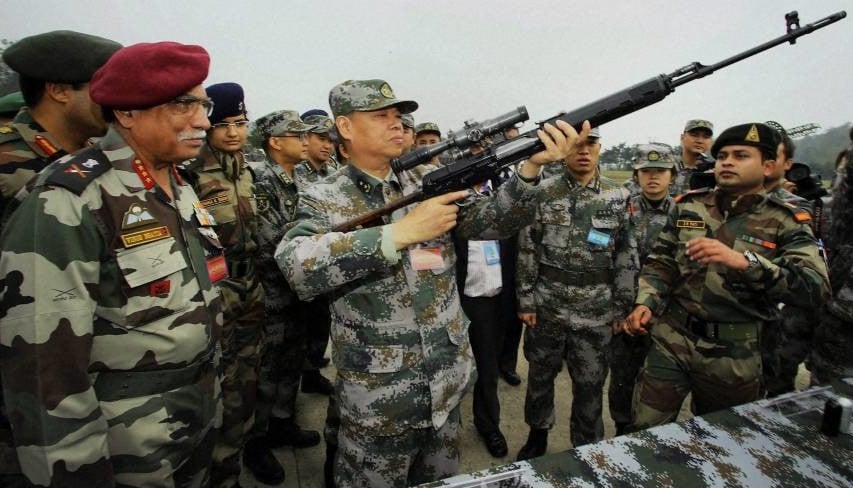India and China are like those friends who become friends at times of need and strangers when both are self-satisfied. India had been in a war with China in 1962 which was won by the latter. If this situation arose again does India have enough resources to tackle China? Who will win in the next Indo-China war?
Let’s look at the 1962 war first:
Firstly, those who back China referring to 1962 must realize that it’s India’s ‘Advance Policy’ which provoked China for a war. Nehru as per that policy established advance posts even beyond the actual line of control after relying upon intelligence report that China wouldn’t react. China was facing the Tibetan uprising then. Thus, China initially did a retreat and remained non-reactive for around eight months. Then it mobilized its military in huge number and started being offensive on from October 20, 1962.
Indian soldiers were very few in number, and not ready for the war. They were outnumbered and simply started to flee. China continued its offensive and announced a unilateral ceasefire on 19th November 1962, retreating many of the areas it occupied except some disputed territories. One must realize it was not Indian army’s defeat rather defeat of Nehru’s strategy for which Krishna Menon was later made accountable.
If, by any chance, a war between the two countries takes place, here’s what we need to consider according to this:
The Indian military will go on high alert but won’t immediately start a mobilization because a full-scale war is unlikely. However, India will deploy troops, armour, and missiles closer to China, also try to obtain more intelligence on China through the US, France, and Israel. Maintain contacts with the militaries of all neighbouring countries and those having territorial conflicts with China.
The militaries of Taiwan, Vietnam, and South Korea will go on elevated alert, to match the posture of the Chinese and North Korean militaries.
The Media will pick this up quickly, and people all over India will start gathering in protest against the war. The Chinese public may be confused for a few days because their media will give only very limited coverage and the purpose of declaring war won’t be entirely clear. However, people in Hong Kong and millions of Chinese living abroad will start protests against the war.
The stock markets and real estate in China and India will fall hard. USD and gold will gain on demand in Asia. Shares of defence suppliers from Europe, Taiwan, South Korea and Israel will gain (same for Japan’s and US defence industry, but to a lesser degree). Real estate in the US and Australia will gradually become more expensive over many months (as big money moves away from Asia), possibly continuing an initial jump. Oil prices will fluctuate – first go up on uncertainty, then potentially fall back in two weeks when no major war unfolds but industries start slowing down nevertheless.
The US military will go on elevated alert in Japan, South Korea, the Persian Gulf, as well as in Guam and Diego Garcia – as the declaration of war can mask an attempted annexation of Taiwan or an attack on disputed islands in the South China Sea. North Korea may be tempted to do something crazy. Satellites will watch nuclear silos more carefully in China, India, and Pakistan. Reconnaissance planes will be flying a lot more often around China, Taiwan, North Korea, India, and Pakistan. The US surface Navy will deploy to protect major shipping routes and discourage direct confrontations between the Indian and Chinese Navies. US submarines will deploy to the Taiwan Strait while one or two carrier strike groups will approach Taiwan from the East.
The UN Security Council will convene within days. Russia and the UK – demonstratively neutral – will lead the efforts to avert a war (but Russia may try to use the opportunity to sell more weapons to both sides, covertly). As a direct participant of the conflict, China will be ineligible to vote on relevant issues, so no veto power. The US and France will stay involved, but not forcefully, trying to figure out what’s behind this and what leverage remains. For example, the US may threaten new weapons supplies to Taiwan. If any evidence is found that China was planning a sneak attack on Taiwan, the US may support Taiwan’s declaration of independence.
In a week, it will be clear to everyone that it makes little sense for China to attack India (other than in isolated border skirmishes). The two countries are separated by enormous natural obstacles, don’t have the ability to move a lot of troops and supplies abroad, but have a lot of weapons useful for defence, including active anti-ballistic defence programs. In other words, offensive operations won’t accomplish much. Given the enormous damage caused to the economy with every day of a freshly declared war, China will either call it off quickly or clarify that it did not intend to start a full-scale war. In the meantime, cyber-warfare will intensify.
Conclusion:
The Chinese do not have sufficient probability of waging war against India and achieving their objectives. Therefore, they are unlikely to declare war. In the event they do make that mistake, the Indian people will unite as one to meet the challenge simply because the Indian public opinion is crystallized around the idea that the Chinese betrayed the Hindi-Chini Bhai-Bhai in 1962.













